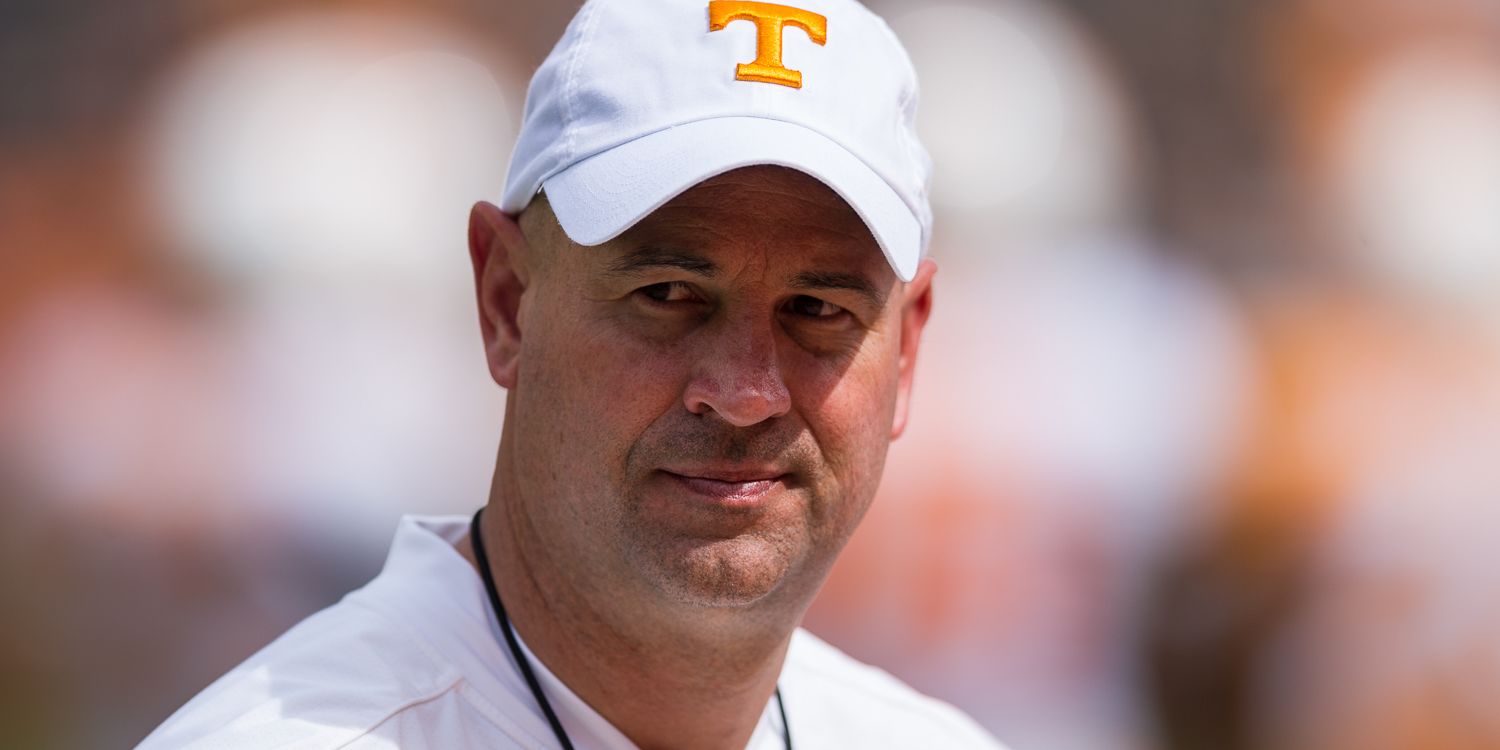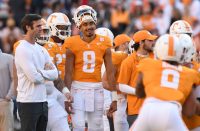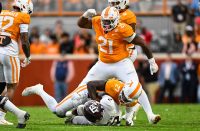We learned quite a bit about Derek Dooley and, even in one year, Lane Kiffin. But I’m not sure we learned a whole lot from them. Kiffin wasn’t here long enough for that, and even three years for a hire like Dooley tends to play out in a predictable pattern: this probably won’t work –> yep, this isn’t working –> okay, let’s move on. Even as some of us spent lots of time arguing injuries and inheritance meant we needed most of that third year to make an informed decision, the final verdict on Dooley was the same as the quick one.
But with Butch Jones, we had five years. You don’t stick around five years at a place without a tangible hope that it might work. And along the way, you get a chance to learn not only about the head coach, but from them.
It’s easy for many to simplify the final verdict about Butch Jones as some form of lol nope; there are plenty of intern jokes out there. I’m far more interested in what we learned from Butch Jones: what did the last five years teach us as Tennessee fans?
And how will that impact what we’re getting ready to learn from and about Jeremy Pruitt?
#1: What Will We Learn About Jeremy Pruitt?
When you grow up with the late Majors and Fulmer teams, you learn that Tennessee wins except, for frustrating lengths of time, against Alabama or Florida. When “scoreboard!” is your friend, you value it. A lot.
The last ten years have forced us to look beyond something so simple; the Vols are 62-63 since 2008. With Jones specifically, the scoreboard was just favorable enough, just long enough to allow us to hold on to the idea of something more. The Vols were almost bowl eligible in 2013, almost beat Florida in 2014, almost did far more in 2015, and still almost made the Sugar Bowl in 2016. Almost.
Playing the almost game long enough makes you step back and look at the bigger picture. In this year’s Gameday on Rocky Top preseason magazine, we took a closer look at Butch Jones in close games: 24 of his 55 contests against FBS foes were decided by one possession, and 15 of those were decided on the final play. Those are extraordinary numbers, and even when you win your fair share of them – Jones was 8-11 in one-possession games and 5-6 on the final play before things went south last season, finishing at 10-14 by one-possession and 6-9 on the last snap – too many close games will drive your fan base crazy.
I feel like this is what I learned, more than anything else, from Butch Jones: every play matters. Not so you can make more of them in the fourth quarter to earn an unsustainable winning percentage in close games. But so you can avoid, as much as realistically possible, playing close games altogether.
Don’t Waste Opportunities
In Butch’s first year, with Justin Worley and an all-star offensive line, the Vols were 37th nationally in tackles for loss allowed per game (stats from Sports Source Analytics). The next four years, including two with championship-caliber teams, the Vols were 125th, 108th, 53rd, and 121st. The offense went backwards an awful lot. Wasted plays behind the line of scrimmage became far too normal. Along with infamously freezing in crucial situations – 2014 Florida, 2015 Oklahoma, 2017 Florida – play-for-play, the offense failed to take advantage as much as it should have.
Butch Jones could have won a couple more close games and still been the coach here, or lost a couple more and been fired in 2015. But in the final analysis, it was an inability to take appropriate advantage on every play that cost Jones and his teams.
The temptation will be to measure Jeremy Pruitt by simply the wins and losses: six wins is a job well done, five not so much. But one thing I learned from watching Butch Jones the last five years is how much every play is worth. It’s why I find myself gravitating to things like S&P+ (and KenPom) more and more.
Don’t Waste Memories
This sport is about the outcomes, and the moments they create. Memories remain college football’s most valuable asset, for fans and for a coach seeking to earn another year. We wrote in the aftermath of the Georgia loss last year that Jones’ inability to create memories that lasted hurt him more than anything. His best wins are dragged down by the eventual disappointment of the seasons they came in.
Jeremy Pruitt will have the opportunity to make memories this fall. If one of those six wins is the Gators, we’re going to have a good time. Those memories feel like they get made in dramatic fourth quarter finishes. But the best way to truly make them is to focus on the ol’ process: being as efficient as possible on every snap.
What Will Progress Look Like?
We’ll measure Pruitt by the wins and the memories, but coming off last season there is plenty of progress to be made play-for-play. And especially now, how close the Vols are coming can be a great indicator.
Consider this: in Tennessee’s golden age from 1989-2001, the Vols lost five games by 17 points (three possessions) or more: Alabama in 1989, Florida in 1991, 1994, and 1995, and Nebraska in 1997. All five of those teams were in the Top 10, three in the Top 5.
Then the Vols jarringly lost four times by 17+ points in 2002, but at least all four of those teams were in the Top 20. In the next four years Tennessee lost one game each season by that margin, three to Top 10 teams and to #11 Arkansas in 2006.
In 2007, the Vols lost to #5 Florida and unranked Alabama by 17+. In 2008 it was #4 Florida, #2 Alabama, and unranked South Carolina, and Fulmer was out.
Kiffin had two such losses (unranked Ole Miss and #12 Virginia Tech). Dooley had nine in three years, though six of them came to teams in the Top 10. And Butch Jones had a dozen in five years. The first nine were against Top 10 teams – the schedule wasn’t kind, no doubt – but at the end of last season, the Vols were trounced by Missouri, #20 LSU, and Vanderbilt.
So after only five three-possession losses in 13 years, an aberration in 2002, then one-per-year through 2006, the Vols have lost by 17+ points 28 times in the last 11 years. Seven of those came to unranked teams.
Just being competitive won’t make a whole lot of memories. But in 2018, it would absolutely be progress.
Every play matters. And I think this coaching staff, with its pedigree from the top down, will do a better job understanding that, and calling the game accordingly.
There will be a bunch of little things we learn about Pruitt this fall, and an even longer list he’ll learn himself. It’ll take more time than this season to figure out what Jeremy Pruitt’s teams will teach us as fans. But we learned from Butch Jones’ teams that almost is especially painful and being satisfied with close games and the mysterious “we have a chance to win” is a treadmill in disguise. Every season is relative, telling its own story. But every play matters. I look forward to seeing how much Jeremy Pruitt can make them matter, this fall and beyond.
10 Questions for 2018
10. Which backups on the defensive line will be starters in 2019?
09. Can special teams make the difference in a coach’s first year?
08. What do we know about Tyson Helton’s offense from his time at USC?
07. Who’s the third/fourth wide receiver in an offense that will actually throw them the ball?
06. What about team chemistry with a first-time coach and a hodgepodge of players?
05. How much ground can the Vols gain in year one on the non-UGA SEC East?
04. Could the offensive line actually be a strength now?
03. Who wins the QB battle, and how will Pruitt manage it throughout the year?
02. Could two freshmen start at corner?





Unfortunately I think the biggest thing we will learn about Jeremy Pruitt this year is how well he handles adversity.
Definitely something to be said for that. Dooley never learned, and thus neither did his teams, how to respond/put on more steam. Pruitt isn’t used to getting beat at all, let alone getting beat badly, so how he handles that if/when it plays out will be important even if we’re building toward losing fewer three-possession games.